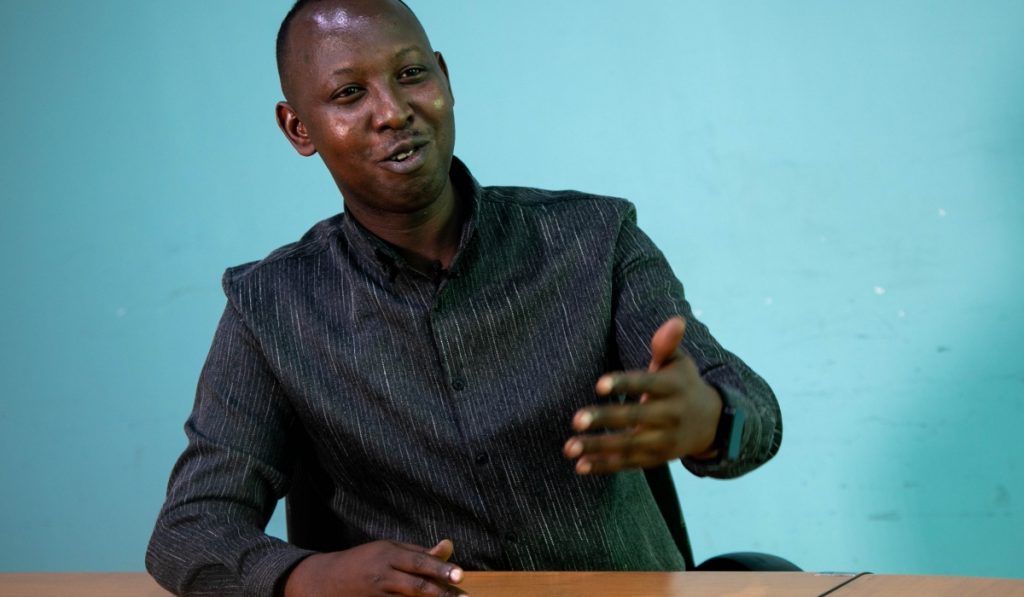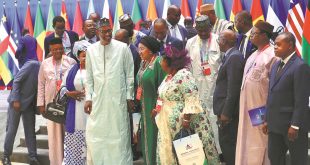Published: September 02,2022

Gatera during the interview. / Photos: Willy Mucyo
For some time now, China has been among the world’s fastest-growing economies, with real annual gross domestic product (GDP) growth averaging 10% annually, a pace described by the World Bank as “the fastest sustained expansion by a major economy in history.”
To live and thrive in China, more so when you are a foreigner, you need to be at the same pace of doing things like the Chinese, or at least have the same mind-set.
It is that mind-set that has enabled the Asian country to become the world’s largest economy manufacturer, merchandise trader, and holder of foreign exchange reserves.
When Andrew Gatera left for China in 2010, his mission was to join the Communication University of China to pursue his Bachelor’s degree in telecommunications, where he would later stay to continue with his Master’s.
That was not all. At the time, Gatera was in Uganda where he had been studying and doing part time work with telecom companies, an area he had always had interest in. Then, many Chinese traders were coming to Uganda and East Africa in general.
“The Chinese were trying to do a lot of trading in Uganda. They got involved in the telecom business and I got a chance to actually see how they were doing their things,” Gatera says.
Noticing how aggressive and powerful in trade the Chinese were, Gatera decided to go and study in China, in a bid to learn more about Chinese philosophy. However, at the tender age of 18, it was not going to be easy.
“It was very challenging because when I went to China that time, I found myself alone at the university, the only African person,” Gatera recalls.
With no knowledge of the language, he found himself in the most challenging of situations, where he was not able to even get basic necessities such as food.
Learning Chinese
Gatera decided to quickly learn Chinese because he didn’t have any other solution to survive in the vast Asian country and also make friends.
“I needed to be close to people and got engaged in learning the Chinese language which helped me to catch up. It was very tough but I managed to bond,” he says.
Today, Gatera is a fluent speaker of Mandarin and whenever Chinese business delegations come to Rwanda, he is called to translate, and whenever he gets Chinese tourists booking with his tour company, he easily helps them around.
Learning Chinese itself was very challenging. It was almost a sacrifice but once you learn it, you know it is a rich language because it has many words and one word can mean many things.
“It’s very challenging, but at the end of the day, once you have the basics, it can be really easy,” he says, but most importantly, he wanted to feed his passion for business.
“The reason I went to study was also to have an opportunity to actually see how they do their things, and basically come back home. I went with the mind-set that at the end of the day I’ll come back home,” he says, adding that learning the language was part of the package he wanted to come back with.
To be fully able to start speaking the Chinese language, you have to take up to four classes, one level leading to the other.
For him to fully master the language and be able to communicate effectively, or have the communication skills to communicate with the locals, he had to continue learning until he attained the highest level of Chinese proficiency, known as the HSK 6.
It was not until that level that he had to join the university to take on his course and later on a Master’s degree.
“The journey was not easy, but I knew I really had to learn the language before I made a move to return home or join the business community in China,” Gatera says.
Finding yourself in such a country with a big population can be really challenging but it is all part of learning.
The culture is totally different and for a country of that size, you can even feel lost but Gatera’s vision was to finish what took him there and then return to Rwanda to apply the business skills he learned there in his own country.
It took him six years to learn and perfect the language but he says he is still learning every day. However, along the way, he learnt enough Mandarin to also be able to teach others, including in Ghana, where he did his internship eight years ago.
Venturing into the business world
While in China, Gatera learned a lot particularly in business, based on how the locals were doing things and he could not wait to finish and return home to set up something for himself.
Having got the exposure, experience and now the language, it was time to return home and leverage what he acquired.
Unlike many people who study abroad and come back to start job hunting, Gatera’s heart was in starting his own business because even as a child, the dream was always doing business.
“I always dreamed of having a business and I thought that’s where you’re free to actually perform at your highest level and to me given the history of our country, I thought there is a lot of contribution needed.
“I also thought I would contribute better if I’m in a sector where I can probably explore. I can put my mind to work and perform better. I also saw a lot of opportunities,” he says.
His first idea was to venture into e-commerce because it was booming in China. He noticed that in China everything is bought online, especially during winter, because you don’t want to go out in the freezing weather.
Diverting to tourism
When e-Commerce didn’t pick up as expected, Gaterajumped into the hospitality and tourism sector, to leverage not just on his contacts in China but also tap into the market of Chinese tourists.
Today, he runs G-Step Tours, one of the leading tour companies. This was mainly because even in China he was involved in tourism, indirectly, leading people to and providing information about Rwanda.
In China he was referred to as ‘Rwanda’s Ambassador’ because he often talked about the country and shared details whenever asked, and when he returned, several Chinese friends asked him about visiting Rwanda.
He saw an opportunity and opened a company. It performed very well, in 2019, two years after starting,it was awarded the best new tour company of the year. Unfortunately, the Covid-19 pandemic broke out when G-Step Tours was really picking up.
Nevertheless, he never closed shop. Even today it is still running and he has opened other businesses including a brand-new coffee shop, a restaurant and pizzeria.
Gatera says that he is lucky that Rwanda is a country that focuses on making the business environment and landscape work, more so for young people.
“You just have to think about solutions. The problem we have is that once people start businesses, they think after three months, they’re going to be rich.
“Once they do not see the profits coming in, they start thinking about Plan B and that’s not the right time to think about Plan B,” he says, adding that when you are resilient and stay on course, a business in Rwanda has high chances of surviving if you are doing the right things.
He says the problem most young businesses face is that people don’t think of reinvesting the profit, instead they think the profits should go straight to one’s pocket.
Gatera advises young people to be resilient and focus on nurturing a dream. A good example he gives was taking a risk of opening a pizzeria even when the pandemic was still around but he saw an opportunity for a service that was needed.
He adds that the beauty with Rwanda, everywhere you look, there is an unexplored opportunity.
Tourism and hospitality go hand-in-hand. He saw an opportunity in coffee, hence, setting up to establish a business that would give tourists a chance to engage in cultural ritualism, considering that Rwanda has some of the best coffee in the world.
“We are doing the all the coffee experience and it’s connecting tourism from the point you enter the coffee shop, you see the coffee story, how coffee is grown from the seedlings to the growth, the cherries, the harvesting, the drying, the roasting and into the cup,” Gatera says.
The journey has not been without any challenges. Most of the businesses he does are capital intensive and access to funds to scale up the entities remains limited. That limits how much he or others in this kind of business can do.
Gatera’s advice to the young people is to work hard and smart and stop the mentality of thinking that things come easy. His other philosophy is, if you want to offer good services, train your staff to do so.
www.newtimes.co.rw
 Africa -China Review Africa -China Cooperation and Transformation
Africa -China Review Africa -China Cooperation and Transformation
